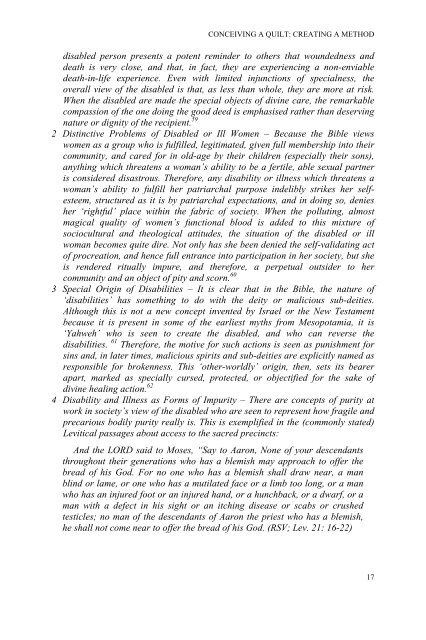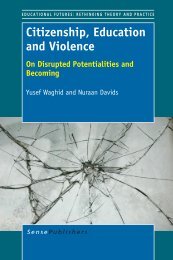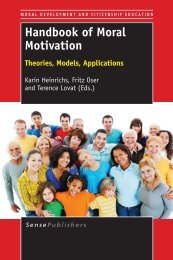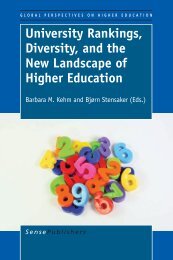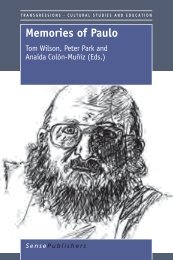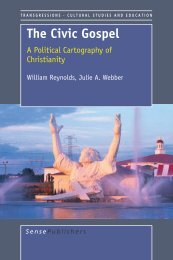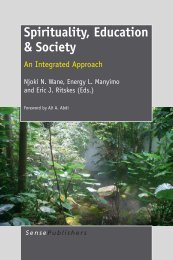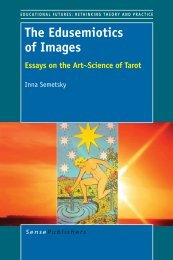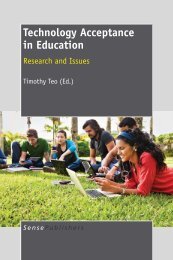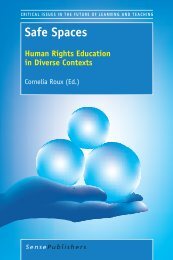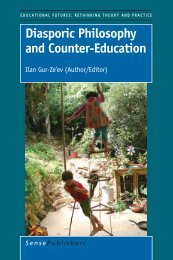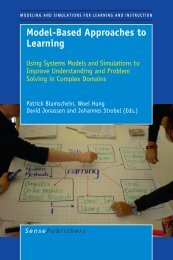Rupturing Concepts of Disability and Inclusion
Rupturing Concepts of Disability and Inclusion
Rupturing Concepts of Disability and Inclusion
Create successful ePaper yourself
Turn your PDF publications into a flip-book with our unique Google optimized e-Paper software.
CONCEIVING A QUILT: CREATING A METHOD<br />
disabled person presents a potent reminder to others that woundedness <strong>and</strong><br />
death is very close, <strong>and</strong> that, in fact, they are experiencing a non-enviable<br />
death-in-life experience. Even with limited injunctions <strong>of</strong> specialness, the<br />
overall view <strong>of</strong> the disabled is that, as less than whole, they are more at risk.<br />
When the disabled are made the special objects <strong>of</strong> divine care, the remarkable<br />
compassion <strong>of</strong> the one doing the good deed is emphasised rather than deserving<br />
nature or dignity <strong>of</strong> the recipient. 59<br />
2 Distinctive Problems <strong>of</strong> Disabled or Ill Women – Because the Bible views<br />
women as a group who is fulfilled, legitimated, given full membership into their<br />
community, <strong>and</strong> cared for in old-age by their children (especially their sons),<br />
anything which threatens a woman’s ability to be a fertile, able sexual partner<br />
is considered disastrous. Therefore, any disability or illness which threatens a<br />
woman’s ability to fulfill her patriarchal purpose indelibly strikes her selfesteem,<br />
structured as it is by patriarchal expectations, <strong>and</strong> in doing so, denies<br />
her ‘rightful’ place within the fabric <strong>of</strong> society. When the polluting, almost<br />
magical quality <strong>of</strong> women’s functional blood is added to this mixture <strong>of</strong><br />
sociocultural <strong>and</strong> theological attitudes, the situation <strong>of</strong> the disabled or ill<br />
woman becomes quite dire. Not only has she been denied the self-validating act<br />
<strong>of</strong> procreation, <strong>and</strong> hence full entrance into participation in her society, but she<br />
is rendered ritually impure, <strong>and</strong> therefore, a perpetual outsider to her<br />
community <strong>and</strong> an object <strong>of</strong> pity <strong>and</strong> scorn. 60<br />
3 Special Origin <strong>of</strong> Disabilities – It is clear that in the Bible, the nature <strong>of</strong><br />
‘disabilities’ has something to do with the deity or malicious sub-deities.<br />
Although this is not a new concept invented by Israel or the New Testament<br />
because it is present in some <strong>of</strong> the earliest myths from Mesopotamia, it is<br />
‘Yahweh’ who is seen to create the disabled, <strong>and</strong> who can reverse the<br />
disabilities. 61 Therefore, the motive for such actions is seen as punishment for<br />
sins <strong>and</strong>, in later times, malicious spirits <strong>and</strong> sub-deities are explicitly named as<br />
responsible for brokenness. This ‘other-worldly’ origin, then, sets its bearer<br />
apart, marked as specially cursed, protected, or objectified for the sake <strong>of</strong><br />
divine healing action. 62<br />
4 <strong>Disability</strong> <strong>and</strong> Illness as Forms <strong>of</strong> Impurity – There are concepts <strong>of</strong> purity at<br />
work in society’s view <strong>of</strong> the disabled who are seen to represent how fragile <strong>and</strong><br />
precarious bodily purity really is. This is exemplified in the (commonly stated)<br />
Levitical passages about access to the sacred precincts:<br />
And the LORD said to Moses, “Say to Aaron, None <strong>of</strong> your descendants<br />
throughout their generations who has a blemish may approach to <strong>of</strong>fer the<br />
bread <strong>of</strong> his God. For no one who has a blemish shall draw near, a man<br />
blind or lame, or one who has a mutilated face or a limb too long, or a man<br />
who has an injured foot or an injured h<strong>and</strong>, or a hunchback, or a dwarf, or a<br />
man with a defect in his sight or an itching disease or scabs or crushed<br />
testicles; no man <strong>of</strong> the descendants <strong>of</strong> Aaron the priest who has a blemish,<br />
he shall not come near to <strong>of</strong>fer the bread <strong>of</strong> his God. (RSV; Lev. 21: 16-22)<br />
17


